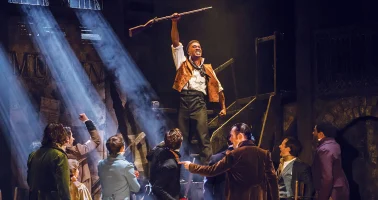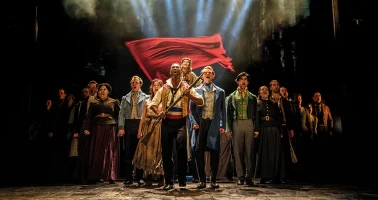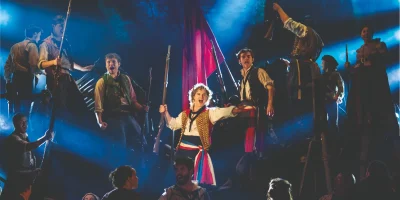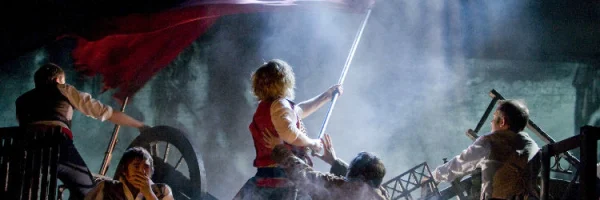
Les Miserables (25th Anniversary touring production at Barbican)
This year sees the silver jubilee of one of the most successful musicals ever - 'Les Misérables'. It's almost beyond imagination to conceive of a musical lasting a staggering 25 years in one city (London) and touring and playing in dozens of other cities all over the world. But such is the phenomenal success of 'Les Misérables'. To celebrate its anniversary, a new touring production of the show has landed at its original home, The Barbican, and so we now have the unique situation of 2 versions of the show running at the same time in the same city. On top of that, in October, there will be 2 concerts at the O2 arena as fans are invited to join in the celebrations. 'Les Miz', as it's affectionately known even to its producer - Cameron Mackintosh - is not just a show, it's a full-blown, global industry.
Based on Victor Hugo's humongous novel of 1862, there's not much in the way of japes and jests in the storyline. Doom and gloom are the dominant factors which bubble through right from the start. But, as with many musicals, we do get a happy ending in the form of a wedding. And we all like a nice wedding, don't we? Well, don't we? Yes, it ends up in a huge dollop of sentimentality - hardly a surprise really, and perhaps another reason for its success.
This new version, directed by Laurence Connor and James Powell, sports Matt Kinley's powerful set design and glorious projections inspired by the paintings of Victor Hugo. There are gigantic images of sewers, for example, which work quite brilliantly. And I particularly liked Paul Constable's subtle lighting which, when combined with the costumes, particularly in the country scene, gave the effect of viewing a painting in an art gallery. The orchestra, under the direction of Peter White, is about as good as you can get, and the formidable company singing is often emotional and inspiring. Added to that, the principals are all well-cast and on first-class form. John Owen-Jones as Jean Valjean and Earl Carpenter (Javert) both have the exceptional vocal qualities required for their parts, and Gareth Gates is the energetic and handsome student Marius who is saved at the barricade by Valjean and eventually marries Katie Hall's charming Cosette. All-in-all, it's a fine, well-directed cast that leaves nothing to grouch about.
I've seen 'Les Miz' several times - not because I'm an ardent fan, but because I am hauled along to it when friends and relatives fetch-up in London. But others are more dedicated fans. I know one person who has seen the show more than 30 times. He's not on his own. Though many people don't say exactly how often they have seen it, a quick internet search reveals a list of thousands who say they have seen it 'many times'.
When it first opened back in 1985, 'Les Miz' hardly received what one might describe as critical acclaim. And the operatic, sung-through format (where exposition is entirely sung, with no dialogue) could easily have prevented a mass audience appreciating the work. But word of mouth seems to have been the key factor in filling its first home before it transferred to the West End, where it's remained ever since.
Universal themes which span cultural contexts and language barriers, appear to have captured the imagination of the world's theatre-going audiences, as well as pulling in many people whose natural inclinations would not normally entice them to the theatre. The songs are melodic, many are rousing and some send that essential tingle down your spine. Added to this, the staging is on the grand side as the plot twists and turns its way from ship to countryside and even into sewers. It's pacey, energetic, and possibly a little hypnotic to boot. In spite of some strange turns in the plot, it does demand attention, and gets it.
Since 'Les Miz' opened, the world has changed. Personal computers were hardly known in 1985, and the internet was yet to be discovered by the population at large. But even the immediacy of the web doesn't seem to have put a single barricade in the path of the onward march of 'Les Miz'. Indeed the recent success of Susan Boyle's version of 'I Dreamed a Dream' has probably only added to the longevity of this show.
No matter what I - or any other critic or reviewer - says about this show, it looks set for many more years of success. In a sense, it now has a momentum of its own which means people visit just to see what the fuss is about, and to be part of the phenomenon and, indeed, history. And when you're dealing with a theatrical colossus spanning this kind of time-scale there will always be new audiences every decade or so to keep it raking in the customers. All I can really say is 'Happy Birthday, Les Miz!'
"The show comes with a new propulsive momentum."
Mark Shenton for The Stage
"A handsome and moving new staging."
Henry Hitchings for The Evening Standard
Frequently asked questions
What is Les Misérables about?
Do you hear the people sing? The iconic West End classic returns with a fresh staging and design. Even if you’ve seen Les Mis before, you haven’t seen it like this. This global hit tells a timeless story of redemption and revolution, complete with famous songs like “I Dreamed A Dream.” Get your tickets to Les Miserables at the Sondheim Theatre today.
How long is Les Misérables?
The running time of Les Misérables is 2hr 50min. Incl. 15min interval.
Where is Les Misérables playing?
Les Misérables is playing at Sondheim Theatre. The theatre is located at 51 Shaftesbury Avenue, London, W1D 6BA.
What's the age requirement for Les Misérables?
The recommended age for Les Misérables is Ages 7+. Children under the age of 16 must be accompanied by and sat next to an adult ticketholder (18+). Children under the age of 3 will not be admitted..
How do you book tickets for Les Misérables?
Book tickets for Les Misérables on London Theatre.
What are the songs in 'Les Misérables'?
Les Misérables is a sung-through musical featuring many classic songs like “Bring Him Home,” “Stars,” and “I Dreamed a Dream.” Read our complete guide to the songs in Les Misérables.
Who wrote 'Les Misérables'?
Les Misérables is an adaptation of Victor Hugo’s novel. The musical was written by Claude-Michel Schönberg (music) and Alain Boublil (French lyrics), with Herbert Kretzmer providing the English-language libretto.
Who directed 'Les Misérables'?
Trevor Nunn and John Caird directed Les Misérables on stage, and the duo won a Tony Award for their work on the show in 1987.
When did 'Les Misérables' open in the West End?
Les Misérables opened at the Barbican Centre on 8 October 1985, then transferred to the Palace Theatre on 4 December 1985. It later moved again to its current home at the Sondheim Theatre on 3 April 2004.
Is 'Les Misérables' appropriate for kids?
This production is suitable for children over the age of 7. An adult must accompany any children under 16, and children under 3 will not be admitted into the auditorium.
Is 'Les Misérables' good?
An epic spectacle, Les Misérables continues to leave audiences breathless after over thirty years with its beautiful score and captivating story. Read our five-star review of Les Misérables.
Is 'Les Misérables' a true story?
Whilst Les Misérables is an adaptation of Victor Hugo’s novel of the same name, this fictional work dives into the inequalities of 19th-century France, including the June Rebellion of 1832.
Is 'Les Misérables' an opera?
No, Les Misérables is not opera but is categorised as a sung-through musical. The show seamlessly weaves spoken dialogue with various musical styles to tell the story. Find out more about the songs in Les Misérables with our song guide here.
Originally published on








